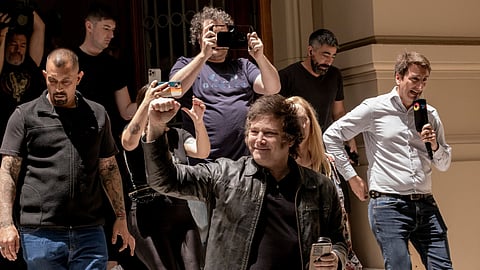Argentina’s Milei eyes swift end to FX controls, promises ‘rock-solid’ Peso
Argentine President Javier Milei is poised to shake up the country's economic landscape, hinting at the imminent lifting of currency controls and a move towards a flexible exchange rate. His vision includes closing the central bank, fostering a "competition of currencies," and ensuring a stable peso. This bold approach aims to attract international capital, address inflation challenges, and revitalize Argentina's position in global markets. As Milei pushes forward with his economic agenda, marked by significant interest rate cuts and a strategic alignment with the International Monetary Fund, Argentina braces for a transformative economic shift under his libertarian leadership.
Sign up for your early morning brew of the BizNews Insider to keep you up to speed with the content that matters. The newsletter will land in your inbox at 5:30am weekdays. Register here.
By Manuela Tobias and Patrick Gillespie
Argentine President Javier Milei sees his government lifting currency controls very soon as his economic team works to clean up the central bank's balance sheet.
"The truth is that we're very close to lifting" controls, Milei said Wednesday at a conference in Buenos Aires, without providing more specifics on timing. "It's in our plans to lift them as soon as possible."
Milei added that he expects his central bank to move toward a "flexible" exchange rate at some undefined point. The monetary authority right now holds a tight grip on the peso, only allowing it to devalue 2% a month despite monthly inflation four times that level. Milei said further unwinding of the central bank's debt liabilities and accumulating more foreign reserves would be essential steps.
The libertarian president vowed to march forward eventually with his campaign promise to close Argentina's central bank and create a "competition of currencies" where people can choose the money with which they want to conduct legal transactions. He insisted the peso would be fixed at that point.
"The peso will be like a rock, it won't move," Milei said, again declining to provide more specific details. "You can all choose what currency you do transactions in."
Argentina is locked out of international capital markets in part because of a cobweb of currency controls and capital restrictions mostly imposed since 2019 when a left-leaning Peronist government came to power. That government defaulted on Argentina's dollar bonds in 2020, and investors see lifting the currency controls as a crucial step in returning to markets.
Milei also went on a tirade Wednesday against local economists who claim the peso is overvalued because of the mismatch between inflation and the pace of controlled devaluation, known as a crawling peg. Prices are up by more than 100% since Milei's government took office Dec. 10 while the peso has been devalued by about 59% over that same period, making goods more expensive in dollar terms.
The president commented on his currency strategy after inflation data Tuesday showed price increases cooled for the fourth straight month in April, allowing the central bank to cut interest rates for the sixth time under his watch. Benchmark borrowing costs are now at 40%, down from 133% in December.
On Monday, officials from the International Monetary Fund also anticipated a looming change of currency strategy in the staff-level agreement both sides reached regarding Argentina's $44 billion program.
Read also:
© 2024 Bloomberg L.P.

